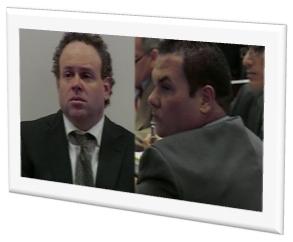 Last Friday’s guest post from Scott Westerman generated a lot of comments and reactions from a number of circles – DJs, managers, and even an owner. The role of the air personality as audience ambassador and community conduit was a big part of Scott’s premise.
Last Friday’s guest post from Scott Westerman generated a lot of comments and reactions from a number of circles – DJs, managers, and even an owner. The role of the air personality as audience ambassador and community conduit was a big part of Scott’s premise.
Yet, as I was perusing the radio news sites over the past few days, it occurred to me that many of the headlines were focused on “D2D” interaction – DJ to DJ – specifically the Bubba vs. MJ trial in Tampa.
And it made we wonder about what’s happened to D2C interactivity – where DJs were more focused on serving, communicating, and entertaining their listeners rather than talking to each other.
The ongoing drama at the Todd Schnitt (MJ) vs. Todd Clem (Bubba the Love Sponge) trial has generated considerable industry press. Radio Ink even asked the question: “Is The Era Of Shock Jocking About To End?” They featured interviews with lawyers, handicapping the verdict, and speculating as to whether this defamation trial will have a lasting impact on other radio personalities.
(Actually, the Shock Jock Era had two endings: Janet Jackson at the Super Bowl and Howard Stern joining Sirius, but that’s another post for another day.)
Perhaps the real question to ask at this juncture is whether anyone really cares about a couple of morning guys and their ongoing disputes, spats, and feuds. You have to wonder what Larry Lujack, Gary Stevens, and Dick Purtan would say.
There was a time when the goings-on of “shock jocks” mattered in many people’s lives, and while there are probably momentary ratings spikes coming for both of these guys, the bigger issue is whether most consumers are tuned in to the day to day, play-by-play of this trial.
I vividly recall the Stern vs. Mancow wars in Chicago. During the ‘90s, there were many eyes and ears on those battles when jocks duked it out on the air and the audience took sides. Maybe that’s because those were the days when radio personalities played a more important role in people’s lives. A lot has changed over the years, and while radio’s future is closely connected with its ability to build sustainable personality shows that earn loyalty and viral sharing, the fact is that “shock jocks” simply aren’t all that shocking anymore.
And some of the best have moved on. Stern, Carolla, Dahl, and others can be heard in other venues and on different platforms. In a recent release touting his 3 millionth tune-in for his online show, Tom Leykis said, “It’s just clear from the volume of listeners we now have that there is no need to return to radio.”
What does this say about the on-air environment for personalities at many stations and in many companies? And what does it also say about how DJs and hosts view the new communication landscape?
Both Schnitt and Clem are immensely talented. Their years in radio and their respective ability to enjoy syndicated success are impressive. But the audience isn’t invested like in years past, and today, you have to wonder whether the advertising community really values these antics and histrionics. And, in fact, do they only reinforce perceptions of radio as a second tier, sophomoric medium?
Personalities earn their “currency” by being relevant, topical, and connected to the lives of their listeners and their communities. Not by suing each other for defamation and harassment. Perhaps this trial is great theater and will help both Clem and Schnitt achieve higher ratings and even more visibility. But is this how radio wants its DJs to become more famous?
Tomorrow, we’ll look at the media rock stars of today – the people that Americans are talking about.
You may be surprised by my list.
- Media And Technology In 2025: Believe It Or Not! - April 18, 2025
- In Radio, You Just Never Know - April 17, 2025
- The Secret To Making A Great Podcast (And Great Radio) - April 16, 2025




Leave a Reply